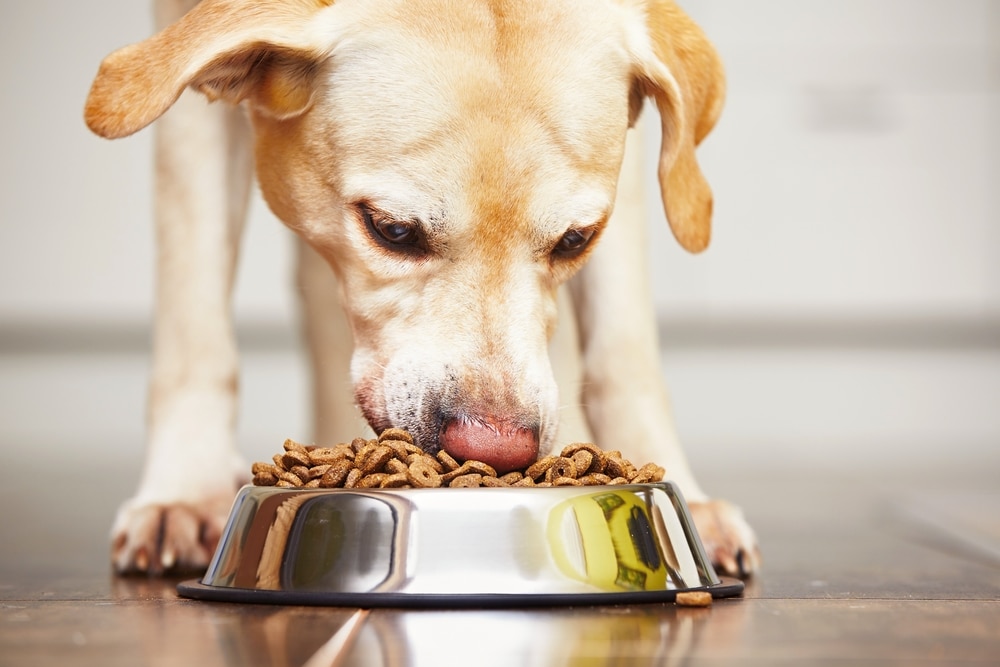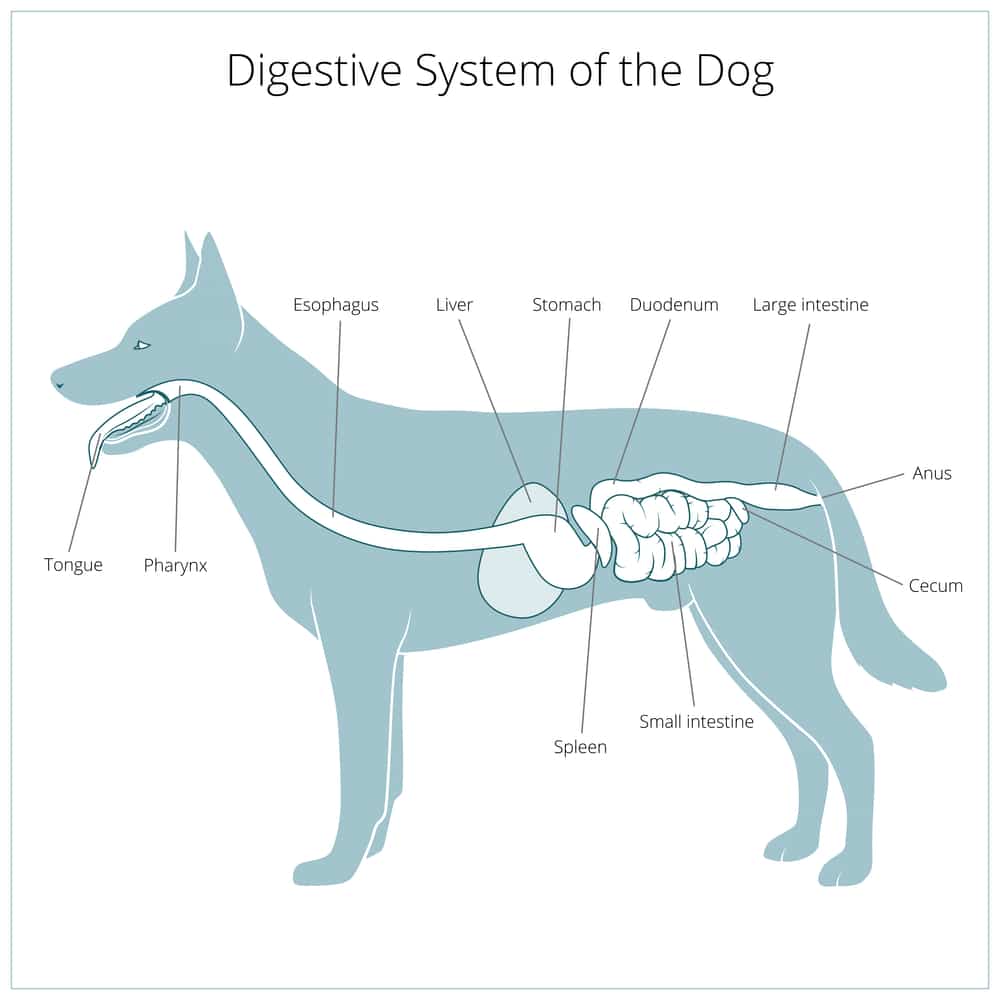
Given how important diet and nutrition are for your dog’s overall health, many dog owners find it worth their time to understand how the canine digestive system works.
Being able to keep tabs on the way your dog digests food and produces waste can help you identify potential health issues early on. If your dog’s digestive system is not functioning as it should, take them to see a veterinarian and have any potential illnesses or more serious health issues addressed before they have a chance to become more serious.
If you want to know how long it should take for your dog to digest its food, you have come to the right place. We will take you through the basics of your dog’s digestive system, including factors that impact how long it takes to digest food, the steps of the canine digestive process, and what you can do to ensure you choose healthy food that your dog can easily digest.
Contents
How Does the Canine Digestive System Actually Work?
While the basic principles may appear similar, a dog’s digestive system functions quite differently than our own. While it is not necessary to have an in-depth understanding of how a dog’s digestive system works, just having a basic understanding of the digestive process can help you stay up to date on any potential symptoms of illness.
Changes in any stage of the digestive process could also give you hints about whether or not your dog was absorbing the nutrients in its food properly. If you notice your dog’s waste has bits of undigested food in it, it might mean that your dog is suffering from a digestion issue or that the kibble your dog is eating was not digestible or did not meet the dog’s nutritional requirements.
The Canine Digestion Process
A dog’s digestive system contains five main stages. For your dog to digest food and absorb nutrients properly, all of the food it eats will have to flow through the following stages:
- The Dog’s Mouth – Unsurprisingly, the first step in the canine digestive process occurs when the dog eats and chews its food. It may sound obvious, but the way your dog chews its food provides important clues about the dog’s overall health. Oral and dental health are incredibly important for the overall health of any dog. If you notice your dog is not chewing its food completely, it swallows food without chewing it at all, or the dog tends to avoid chewing with certain teeth, it could be an indicator that the dog is suffering from a dental issue.
Cracked and split teeth, as well as infected and sore gums, can lead to serious issues for the dog, especially if any infection can seep down into the jaw bone. If you notice your dog’s chewing behavior has changed in any significant way, it might be time to take your dog in for a dental exam with a veterinarian. It might also be an explanation for why your dog’s overall digestive system is not functioning as it should.
- The Dog’s Esophagus – As it is with humans, the esophagus is the designated pathway where both food and water pass from the mouth into the stomach. While it sounds like a fairly straightforward stage in the digestive system, ensuring your dog can swallow food properly is very important.
If you notice that your dog cannot swallow as it used to, it could be a sign of a serious issue that should be treated by a veterinarian immediately. In some cases, problems with the esophagus can be life-threatening and may require surgery. If a dog cannot swallow properly, it can indicate that the dog has swallowed a foreign object, and it has become lodged inside the throat. It is not worth taking any chances when it comes to changes in how your dog swallows its food and water.
- The Dog’s Stomach – As you are probably well aware, the stomach plays a major role in the overall digestive process. The chewed food enters the stomach, where it will be broken down so that the nutrients within can be absorbed in a later point.
As in our own stomachs, a dog’s stomach produces digestive acids and enzymes, which help break the food down. As most dogs age, their stomachs become less capable of breaking down food properly, which is why some veterinarians will recommend foods that are easily digested for senior dogs.
- The Small and Large Intestines of a Dog – After food is broken down inside the stomach, it passes into the intestines. The small intestine is responsible for absorbing the majority of the nutrients from the food. Bile, which is produced within the dog’s gallbladder, combines with the mostly digested food to neutralize any stomach acid passing into the intestines.
Enzymes from your dog’s pancreas further break down the food so it can be digested and absorbed. Once the food is fully digested, the walls of the intestines absorb the nutrients. From there, nutrients flow throughout the body via the dog’s blood. The liver metabolizes the nutrients from the food so the dog can benefit from them properly.
By the time the food reaches the dog’s large intestines, its body has absorbed most of the nutrients. Any remaining nutrients and moisture in the food are then fully absorbed, so the remaining material forms into a stool that the dog can eliminate.
- The Colon, Rectum, and Final Stage of the Digestive Process – The final stages of the digestive system center around the formation and elimination of fecal matter. While it might sound a little bit gross to us, your dog’s stool can tell you and veterinarians about the overall health of your dog’s digestive system.
If your dog struggles to eliminate waste or its stool has an unusual consistency, it could signal that your dog is sick or that something more serious is occurring within its digestive system. If your dog is struggling to defecate, it might be worth contacting your veterinarian. You would be surprised how many serious health issues can be identified just from the way a dog produces waste.
So, How Long Does it Take a Dog to Digest Food?
Now that you know a little bit more about how a dog’s digestive system works, you might be wondering how long the process takes.
In general, the entire digestive process takes between four and eight hours. In other words, if you feed your dog a meal, roughly four to eight hours later, its digestive system will have absorbed all of the nutrients it can from that food, and the dog should then be ready to produce a bowel movement.
Given that four to eight hours is a fairly significant range, you might be wondering how long your particular dog will take to digest its wet or dry dog food. The truth is, several factors will influence the overall timescale for your dog’s digestive system.
Your dog’s age, size, breed, health conditions, hydration level, and even the type of food it is eating will all impact the amount of time it takes for the dog to digest its food.
The Main Factors that Determine the Amount of Time it Takes Your Dog to Digest Food:
Like our own, the canine digestive system in your dog’s body is fairly complicated, so it does not operate on an exact schedule. The following factors will give you an idea of why the amount of time it takes a dog to digest food can vary so much:
- Your Dog’s Physical Size and Breed – Size is one of the most important factors that will impact the amount of time it takes your dog to fully digest its food. Given that the average weight for different dog breeds ranges so drastically, it is unsurprising that certain dogs take longer to digest their food than others. Just think how much shorter a 5lb chihuahua’s digestive tract is than an English Mastiff’s that weighs nearly 200lbs.
In simple terms, large breeds take significantly longer to digest their food than smaller breeds.
- The Amount of Exercise the Dog Gets – Not only is the amount of exercise your dog gets important for its physical health and overall well-being; it will also impact the duration of the dog’s digestion process. Essentially, the more energy your dog burns through various types of exercise, the faster food and nutrients will move through the digestive tract.
Just like you would for your physical health, you should always manage the balance between caloric intake and the amount of energy your dog uses. If your dog is not active, it will take longer for it to digest its food. On the other hand, if you have a high-energy breed that gets plenty of exercise, you might notice that its digestive system works much faster than a less active dog.
- The Dog’s Age – The efficiency and effectiveness of a dog’s digestive system will wane with age, which is why the rate of metabolism reduces as a dog grows older, which explains why most senior dogs prefer a diet that is lower in protein and calories.
In most cases, the older the dog is, the longer its digestive process will take. Puppies tend to be a unique case, as their digestive systems can take a while to adjust to solid food. If you have ever raised a puppy, you will know how many times they can produce a bowel movement in a single day.
- The Diet the Dog Receives – As you can imagine, different types of food digest at different speeds. In most cases, a dog can digest wet food much faster than it can digest dry kibbles. The quality of the ingredients in the food and the food’s overall digestibility will also play a major role in determining how quickly your dog can digest it.
What Can You Do to Support Your Dog’s Digestive Health?
One of the best things you can do to help your dog maintain a healthy digestive system is to make sure you are always providing your furry friend with healthy food that is appropriate for the dog’s particular breed and life stage. The physical size of the breed and the dog’s age will play a major role in deciding which type of food is best for it.
As you will have noticed, puppies have many different nutritional requirements than senior dogs. Large breeds, especially when they are energetic, require massive amounts of calories, while smaller breeds require less food overall.
Speak with a Veterinarian
If you are unsure what food you should feed your dog, always ask your vet to recommend something age and breed-appropriate. Most veterinarians can even recommend dog food brands known to use healthy and nutritious ingredients rather than fillers and low-quality protein sources.
The best dog food brands use healthy ingredients and have a nutritional profile balanced for the exact needs of a dog. As mentioned previously, certain ingredients are more digestible than others, so the best brands will always select nutritious ingredients that a dog’s digestive system can break down and absorb.
If you give your dog all of the nutrients it needs, it will have a much higher chance of living a long and healthy life.
Final Words
Problems with your dog’s bowel movements and other issues with its digestive system are some of the earliest signs of significant health issues. By understanding your dog’s digestive system and its healthy habits, you will be able to monitor their overall health much more effectively.
If you ever notice any issues, you should always reach out to your veterinarian. Providing your dog with a healthy diet formulated to its exact nutritional requirements will also help you keep your pup feeling its absolute best!


